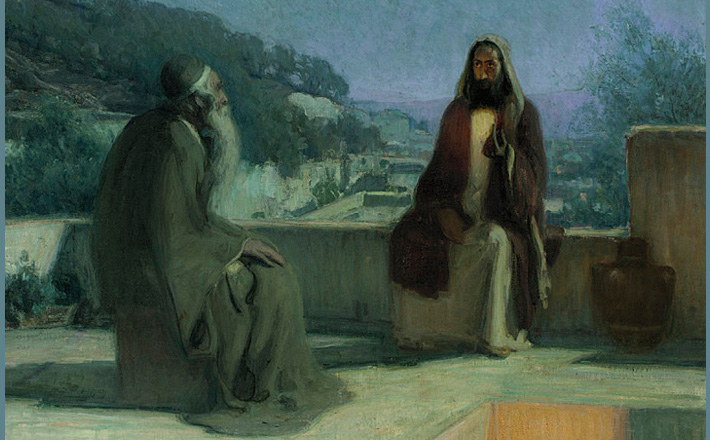Commentary on John 3:1-17
The backdrop against which the dialogue between Jesus and Nicodemus should be understood is John 2:23-25.
Nicodemus is one of those who “believed in his name because they saw the signs that he was doing” (see verse 2). The Jews (a better translation of the Greek Ioudaioi would be Judeans) in 2:18, the many in 2:23, and Nicodemus in 3:2 assume that miracles can legitimate Jesus’ authority.1 But Jesus did not trust them for he knew their motivations.
The structure of the dialogue is simple: Nicodemus makes an affirmation (verse 2) and asks two questions (verses 4,9) and in each case Jesus answers with a categorical answer: “Very truly I say to you” (verses 3,5,11). Later, in verse 13, the dialogue turns into a monologue. This is probably the redactional work of the evangelist addressing the theological implications of the dialogue.
There are three important statements in verse 2, one by the narrator and two by Nicodemus himself: the reference to the night, the title Rabbi and the personal pronoun “we.”
First is the reference to night time: a) Like Joseph of Arimathea, Nicodemus was a secret disciple of Jesus and so came to Jesus at night (see John 19:38-40); b) it is a symbolic reference to unbelief or to the wrong kind of belief (see 3:19-21); c) Since the night was the time for studying the Torah and for theological dialogue, Nicodemus acknowledges Jesus as Rabbi and comes to him at night for a theological discussion. Given the negative connotations of darkness in this gospel, it is probable that the night refers here to unbelief or spiritual misunderstanding. When preaching from this passage it is important to make clear that there are no racial connotations here.
Second is the title Rabbi: In John, it appears only on the lips of the disciples (see 1:38, 49; 4:31; 9:2; 11:8). This could mean two things: either Nicodemus was on the way to becoming a disciple (see 19:38-40, 7:50-52) or he was using the title with some irony, since it would have been highly improbable for a member of the Jerusalem elite to address an uneducated Galilean peasant (compare to 7:15).2 In favor of the first option I would suggest that the three times that Nicodemus appears in John, 3:1-12, 7:50-52, and 19:38-40, seem to describe a progressive coming to terms with discipleship, from believing in Jesus because of the signs, to fully honoring him in death, as a disciple would do to a beloved teacher.
Lastly, the “we” of verse 2 may refer to those who in 2:23 believed in Jesus because of the signs or to the Pharisees, whom Nicodemus represents. Since the Pharisees are depicted in the gospel as the archenemies of Jesus, it is very unlikely that they would have sent him.3 Nicodemus is probably using here a polite exaggeration.
Nicodemus’ initial affirmation: Nicodemus affirms that Jesus has come from God and that God is present in Jesus because of the signs that he does. He thinks that the miraculous is proof of God’s presence. But Jesus is not flattered by this. He knows Nicodemus’ motivations, even when we as readers still wonder about them.
Seeing the signs is not enough. The kingdom of God cannot be detected with the physical eyes. It is rather a reality that can only be perceived through the eyes of the Spirit, after the person has been born “anew” or “from above.” The word anothen can mean both things but the pun is only possible in the Greek language, which places the responsibility for this wording entirely on the evangelist’s shoulders and not on Jesus, whose knowledge of Greek is highly questioned. Here it possibly means “from above,” that is, from God (see 1:13), since this idea is resumed in 3:31 where the evangelist talks about Jesus as the one who comes from above, a persistent theme throughout the gospel.
Nicodemus’ first question: Why did Nicodemus misunderstand Jesus’ words? Several reasons have been given for this: a) It is part of the evangelist’s argument. The reply is aimed not only at Nicodemus but also at the community he represents. b) To be born again, as Nicodemus understood it, would have meant altering one’s ascribed honor status in a very radical way and he was not ready to trade his honorable position in society for an uncertain new status.4
Jesus’ answer clarifies his previous one by way of two synonymous parallelisms. The first is: “no one can see the kingdom of God”//“no one can enter the kingdom of God.” The second is: “without being born from above”// “without being born of water and Spirit.” Seeing and entering the kingdom are two ways of expressing the same reality, as are also being born from above and being born of water and Spirit.
Seeing and entering the kingdom: Unlike the case of the Synoptic Gospels and traditional apocalyptic literature, for John there is no futuristic, earthly dimension of the kingdom of God. Rather in John it is the person that has been enlightened by an experience with God’s only Son, Jesus, which can then contemplate (see) the kingdom and participate fully in it (enter it). Experiencing the kingdom is a present possibility but only for those who have been spiritually awakened to it (compare to Romans 4:13-17).
Water and Spirit are joined by “and” (kai) and governed by the same preposition “from” (ek). It probably refers to one thing, not two, and therefore could be translated as “water which is Spirit.”5.Water is used in John to point at the lower, physical world (1:33; 3:23; 2:6-7; 4:6-7; 5:7) but also at the spiritual world (4:14; 7:37-39). Here, because it is contrasted with physical birth, it refers to spiritual birth. It can also refer to baptism and the new life in the Spirit that was linked with this sacrament.6 At any rate, Jesus is pointing at a spiritual dimension of life that has been completely missed by Nicodemus. Those who interpret this gospel as a coded document for and from a community that was undergoing harassment from the religious leaders of the people of Judea see in this passage a criticism of the leaders of the synagogue. The apologetic implications are clear: the Johannine community, represented by Jesus, is in the know; the Pharisees, represented by Nicodemus, are not.
Nicodemus’ second question: Now Nicodemus realizes that Jesus meant “from above” and not “again.”7 Still, he does not know how this is possible since he asks: “How can these things be?” Jesus’ reply is full of irony: a teacher of Israel does not know what a peasant from Galilee does!
In verse 11, Jesus delves completely into communal language, using “we” and “you” plural. It sounds very much like 1 John 1:1-4. The community speaks through Jesus. They know, yet Nicodemus does not. The community has given testimony (about Jesus, the logos of God) but Nicodemus’ community has not received this testimony. And then Jesus says something that has puzzled scholars for ages. He contrasts earthly things with heavenly things. The problem is that verses 3-8 can hardly qualify as “earthly.” Perhaps it refers to the examples given by Jesus, which are taken from earthly realities (birth, water, wind). Or perhaps because they take place on earth as Jesus begins talking about going to heaven and being lifted up.8
Jewish and Christian mysticism and apocalypticism share the idea of an experience of being transported to heaven to contemplate either God’s glory or the future of history before returning back to earth to communicate this vision to others. Verse 13 seems to be a veiled criticism of such experiences (see 2 Corinthians 12:1-10). What these people claimed was a direct revelation from the Spirit independent from an ongoing connection with Jesus.9
The crux of the argument seems to be this: the kingdom of God is a spiritual reality that can only be seen when the person has believed that Jesus is the agent of God’s new creation. It cannot be detected by the naked eye, or by invoking a special experience of heavenly bliss. None of this qualifies a person for seeing or entering the kingdom, or having eternal life, only the encounter in history with the incarnated logos.
Some of the implications for preaching are: present history — not the future or heaven — is the arena where the kingdom plays out. It is now, not tomorrow or in the world beyond, when the kingdom is to be realized. Rather than leaving it to other generations or to God, this understanding of the kingdom compels us to act in order to transform the world through the power of the ever-present Spirit. When it comes to being born again, inherited status or previous knowledge are not important, only one’s acknowledgment of God’s Spirit acting in history in unpredictable ways. Seeing God’s work requires not only spiritual awareness but also imagination and humbleness.
Notes:
1 Charles H. Talbert, Reading John. A Literary and Theological Commentary on the Fourth Gospel and the Johannine Epistles (New York: Crossroad, 1994), 98.
2 Bruce J. Malina and Richard L. Rohrbaugh, Social-Science Commentary on the Gospel of John (Minneapolis: Fortress, 1998), 81.
3 Rudolf Schnackenburg, The Gospel According to St. John. Volume Two (New York: The Seabury Press, 1980), 366.
4 Malina and Rohrbaugh, Social-Science Commentary, 82.
5 Talbert, Reading John, 99.
6 Schnackenburg, St. John, 370.
7 W. Barclay makes a huge compromise by translating it “be born again from above.” The New Testament. A Translation by William Barclay (Louisville: Westminster John Knox, 1999), 257.
8 Raymond E. Brown, S.S., The Gospel According to John. The Anchor Bible, Vol.29 (New York: Doubleday, 1966), 132.
9 Talbert, Reading John, 101.


March 12, 2017